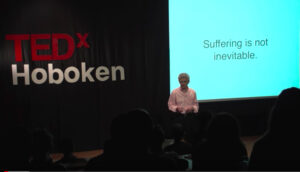The CRWP Teachers As Writers Blog will feature guest posts in July in advance of the National Writing Project Midwest Conference. The NWP Midwest Conference takes place August 3, 4, and 5 in Madison, Wisconsin, and will feature presentations from NWP Teacher Leaders and Site Directors, as well as a keynote and pre-conference from the CRWP’s own Troy Hicks. Today’s post comes from Natalie Owen of the Greater Madison Writing Project in Wisconsin.

I began investigating Mindfulness when I realized after a couple years in the classroom that there is always more that could be done. Mindfulness is finding a way to be more present so we can enjoy our time with students more, approach the natural challenges of the profession gracefully, and be a balanced role model for our students. Here are five tips for teachers looking to incorporate mindful habits.
1. Like yourself just the way you are!
I love that as a teacher I am always wanting to get better. I have found many teachers who also share this endless zest to always improve. I am learning that I also need to like exactly where I am right now as a teacher. Appreciating where we are allows us to give ourselves grace in the forever process which is developing mastery. I’ve also determined once and for all that guilt is unproductive. Enjoy the leisure time you give yourself and stop wasting a good night’s sleep over fretting about what is not yet right.
2. Find your pain points.
Find out what is bothering you about an assignment or what is the root cause of your anxiety, and then look for a solution to combat that exact frustration. For example, I found myself dreading reading student’s timed writing responses to The Catcher in the Rye. There were only three prompts to pick from, and in my years as a teacher, I felt that I had read every possible iteration of each prompt. So, I decided instead of hunkering down to grade eighty of the same essays, I had students either create their own essay prompt to write an essay on, or create an essay tutorial, having students engage in metacognitive thinking explaining to a younger student how they could go about navigating the text and sorting textual details to write an essay on The Catcher in the Rye. Reading through these essays and projects was so much more enjoyable and my students enjoyed it more as well. In fact, they were so refreshing, I have used tutorials and create-a-prompt writing assignments for other units too.
3. Recognize that we are more than our emotions.

“Bad” events do not necessarily need to be interpreted that way. We often attribute meaning to events, and the meaning that we sometimes attribute can cause us stress, not the actual event itself. Viktor Frankl explains how there is space between stimuli and response in his logotherapy manifesto and memoir Man’s Search for Meaning. He reminds readers of the power of the mind when he recounts, “everything can be taken from a man but one thing: the last of human freedoms- to choose one’s attitude in any given set of circumstances.” There is an excellent TED talk on how to decrease the emotional meanings we give events called “How to Stop Suffering” by Marty Lefkoe. For me, dissolving some of the meaning I’ve given to events (e.g., this student is acting this way because they don’t like me) has allowed me to cut out negative stress from my day.
4. Seek to understand.
I have started to believe that each student is doing what is their best, and this has allowed me to try to understand them first. This has been so enlivening for me and has led to some awesome breakthrough moments with students. I realized in the past when I would snap at students, it would often be because of the difficulty I felt they were causing me. Once I was able to create a space between a classroom incident and my reaction, I was able to change the way I spoke with students to get at the root problem. For example, when I had a student blurt out, “this is stupid,” when they were asked to go through their incorrect ACT English questions, where I might have in the past ignored her or just reminded her that this was important for our school and for her future, instead I gave it a second, and went over to her quietly and asked her why she thought this was stupid. It turned into an honest conversation about her frustration with standardized tests and the way she has often felt misjudged by tests. My conversation with her allowed me to encourage and re-affirm her, and she adjusted her perspective and tried the activity again with renewed fervor.
5. Empower students.
“How can I hand this off to students” is one of the best questions to continue asking in education. Students are capable of doing much more than we often acknowledge. For me, empowering students started out of necessity. When I wanted to have our student-created classroom rules typed up, and I had two Cross Country meets that week, I succumbed to asking if there was a volunteer who would be willing to do that for me. At first, I felt guilty because it was “my job” to get that done. Then, I realized I was being ridiculous. Handing off little items like this to students allowed me to involve students more in the class happenings and increase their ownership. Also, having a student synthesize a class list into a typed document was an extension of her learning. Win-Win. Patrick Kelley in his book Teaching Smarter: An Unconventional Guide to Boosting Student Success confessed: “if it is not absolutely 100% necessary for me to do this paperwork myself, I will not do it…if you want more time with students, you have to simplify.” Handing off tasks to students also allows us to be face-to-face more with students, and that is just nice.
I would love to see you at the National Writing Project Midwest Conference! My workshop Mindfulness in Writing Pedagogy: Strategies and Shifts for Loving the Reality of What We Love to Do will be Saturday morning from 10:30-noon.
 Natalie Owen has taught high school English for the past 4 years in Waterloo, Wisconsin where she ran a flex Writing Center and coached Cross Country. She has taught abroad in Uganda and El Salvador and is a graduate of Marquette University. In her free time, she enjoys cycling, reading, and experiencing art.
Natalie Owen has taught high school English for the past 4 years in Waterloo, Wisconsin where she ran a flex Writing Center and coached Cross Country. She has taught abroad in Uganda and El Salvador and is a graduate of Marquette University. In her free time, she enjoys cycling, reading, and experiencing art.

This work is licensed under a Creative Commons Attribution-NonCommercial-ShareAlike 4.0 International License.

Leave a Reply
You must be logged in to post a comment.